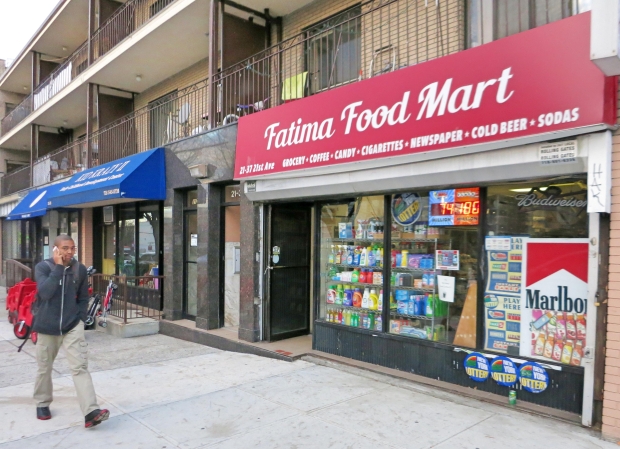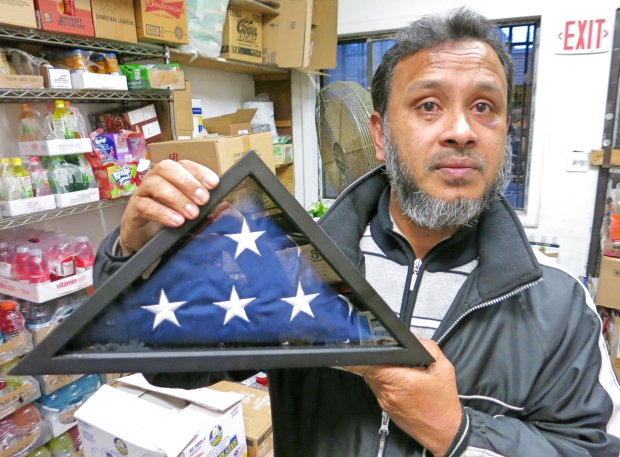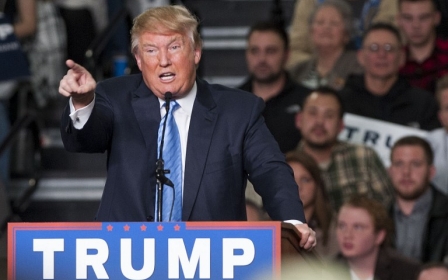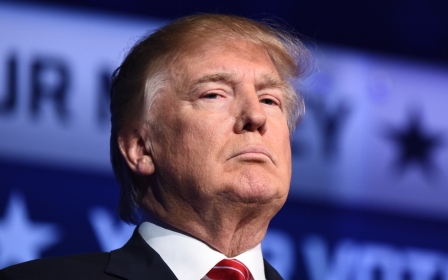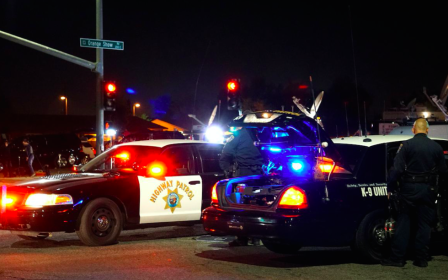Saker Haque: Another American victim of extremism
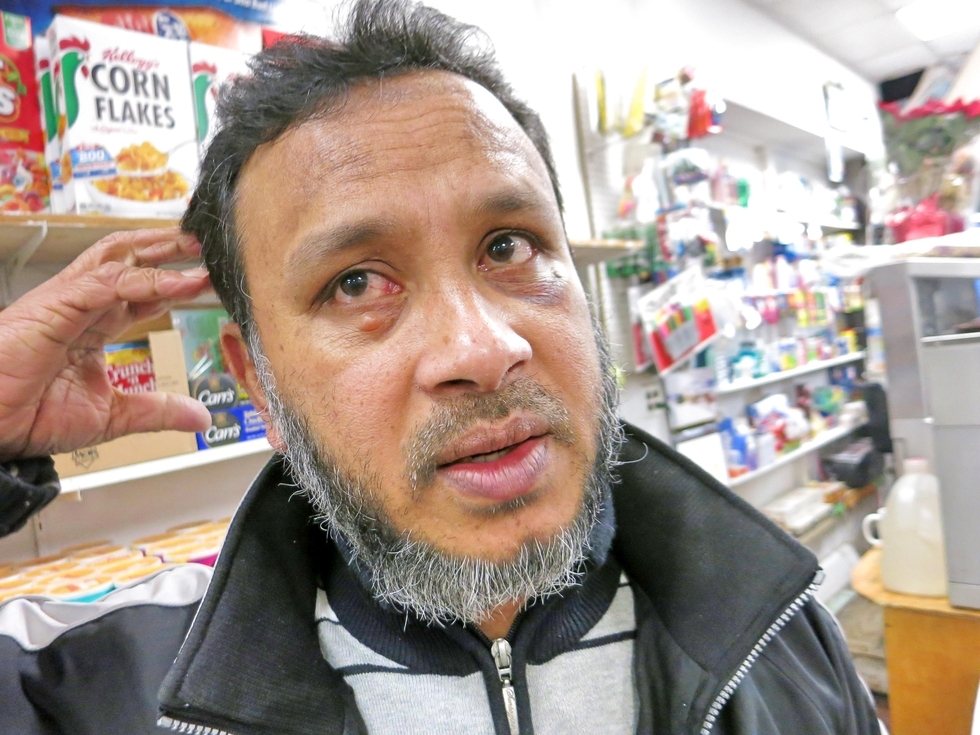
QUEENS, New York, US - Sarker Haque knows the perils of politicians stirring up religious tensions better than most.
The Bangladeshi-American shopkeeper was left fearing for his life when an attacker declared “I kill Muslim” while throwing powerful punches at him.
Speaking to Middle East Eye, Haque warned Republican presidential frontrunner Donald Trump that his words can have dangerous consequences.
“Mr Trump, he’s saying that people are extremists. It doesn’t matter what type of people. He has more influence. He encourages,” Haque told MEE at his grocery, Fatima Food Mart, in Queens.
“He says no to Hispanics, that we don’t need Muslim immigrants. And he is running to be president of the United States. He should be more broad-minded. This is not politics. This is low-minded.”
Haque, 53, was assaulted in the days after the 2 December mass shooting in San Bernardino, California, in which a Muslim couple killed 14 people at a Christmas party.
As the US reacted, Trump said Muslims should be barred from entering the US until officials “figure out what is going on” – a view that was rejected by US figures but nevertheless buoyed the property tycoon’s polling numbers.
“I’m here 28 years in this country,” Haque told MEE. “I was always watching Republican, Democratic candidates talking about politics. But this is the dirtiest politics, what [Trump] is doing. He should not talk about religion.”
It was an otherwise normal Saturday when a man walked into the store and started reading a newspaper before asking several times whether grocery items were free, said Haque.
Then the beating began.
“He punched my head and I fell down. I screamed at him, I say: ‘What’s wrong with you?'” Haque said.
“He was again try to punch me. He told me: ‘I kill Muslim’."
More blows followed. Haque said he thought he was going to die as the attacker split open his lip and pounded his head and neck.
The man eventually tried to flee, but Haque grabbed his coat and, with the help of a local, restrained the attacker until police were called, the shopkeeper said.
Piro Kolvani, 55, of Florida, is due in court on 12 January over the attack.
Haque left his home in Dhaka, Bangladesh, in 1987, and lives in New York with his wife, 15-year-old son and four daughters.
He came to the US for a “better life, better opportunity. And I got it،” he said. During his first decade in the US, religion was seldom mentioned.
“Before September 11, as a Muslim, I don’t even think about it. They don’t think about it, Muslim, Hindu, Buddhist, Jews. In this country, no. Especially New York. This is the most diverse city in this world,” he said.
But a wave of landmark terrorist strikes that began on 9/11 has continued through to San Bernardino and the 13 November killing of 130 people in Paris by IS-linked militants and underscored millennia-old divisions, he said.
“They're all innocent people. I’m sorry for them,” he said. “The world is crazy now.”
After San Bernardino and the Trump controversy, US President Barack Obama warned against tarring all Muslims with the same brush.
At a citizenship ceremony on Tuesday, he described immigration as the oldest US tradition and rejected sealing America’s borders to those fleeing hardship or persecution.
“We can never say it often or loudly enough: immigrants and refugees revitalise and renew America,” Obama said.
He has sought to reassure the public about his strategy for stopping IS in Iraq, Syria and elsewhere while emphasising that the US is a welcoming country that promotes religious tolerance.
Muslims have “nothing whatsoever to do with terrorism” and 99.9 percent reject radical Islam, Obama said.
But he has faced criticism from conservatives, who say that opinion polls of Muslim populations tell a different story.
A 2007 study by Pew Research Center described Muslim Americans as “middle class and mostly mainstream” but highlighted some controversial attitudes.
It found that 26 percent of American Muslims aged 18-29 believed suicide bombings against non-Muslims were a justifiable tactic. Among British Muslims, the figure was 35 percent, and 42 percent in France.
Radical views
“What’s radical to you and me is viewed almost as normal in many parts of the Muslim world,” said Raheel Raza, a Pakistani-born human rights activist who released an online film this month for the right-wing Clarion Project.
“While the vast majority of Muslims don’t believe in suicide bombing, killing apostates, honour killings and stoning, hundreds of millions do.”
Shaun Casey, the US State Department’s envoy for religion and global affairs, said he disagreed with the research and defended Obama.
“There are folk around the world who do in fact want to blame 1.6 billion Muslims for everything that any particular terrorist does,” Casey told MEE.
“As leader of the US and as a leader in the free world, he has to be very careful to tamp down the kind of stereotyping that would … argue that all Muslims are guilty by association, just by virtue of being born Muslim.”
This debate about religious extremism seems far removed from the calm, tree-lined 21st Avenue in Queens where Haque set up shop.
He wants to stay out of politics. Like other Americans, Muslims are “hard-working people” who should be left alone, he said.
But his beating has changed everything. “I'm scared, yeah. I'm scared. I never was, even after September 11. Now I feel insecure,” he told MEE. “If people come to rob your money, okay. But he did not."
New MEE newsletter: Jerusalem Dispatch
Sign up to get the latest insights and analysis on Israel-Palestine, alongside Turkey Unpacked and other MEE newsletters
Middle East Eye delivers independent and unrivalled coverage and analysis of the Middle East, North Africa and beyond. To learn more about republishing this content and the associated fees, please fill out this form. More about MEE can be found here.


